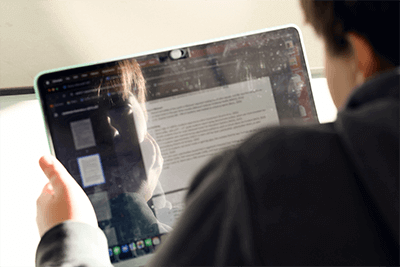February 8, 2024
 from Dr. Bill Hudson, head of school
from Dr. Bill Hudson, head of school
In recent months, I have initiated HeadSpace, inviting MPA parents to join me in addressing how best to ensure that MPA prepares students to “live, learn, and thrive in our increasingly complex and globalized society,” a priority outlined in our strategic plan for 2024ward. A startling statistic I recently encountered suggests that 70% of the jobs in 2030 have yet to be created, underscoring the urgent need for transformative changes in education.
On Tuesday evening, several parents and I engaged in a profound discussion regarding Generative Artificial Intelligence (GAI) and its potential to revolutionize education. GAI represents a unique subset of AI distinguished by its ability to produce new, high-quality content efficiently across various modalities. Unlike traditional AI systems, which primarily focus on analysis and prediction, GAI possesses the capacity for creative synthesis, generating original content such as audio, code, images, text, simulations, and videos. Powered by advanced algorithms, GAI models can learn from existing data to create realistic and novel outputs that emulate human creativity and ingenuity. This capacity for generative creativity holds profound implications for fields such as art, design, storytelling, and content creation, offering limitless opportunities for innovation and expression in the digital age.
Reflecting on how MPA can equip students to thrive in today’s increasingly complex society, I came across a Facebook post from our Alumni Association featuring Sofie Netteberg, an MPA Class of 2016 graduate. Sofie is currently enrolled in the MIT Leaders for Global Operations (LGO) program, where students earn both an MBA from Sloan and an MS from MIT’s School of Engineering with a focus on computer science and operations. A graduate of Williams College with majors in statistics and global studies, Sofie describes herself as a, “Life-long nerd who will use technology to ensure the health and happiness of future generations.”
Sofie attributes her success to the liberal arts curriculum at both MPA and Williams College. “At every stage of my journey, I have relied on both analytical aptitude and interpersonal skills to succeed,” says Sofie. “For students interested in STEM like myself, MPA is ideal because it offers opportunities to delve into advanced courses and clubs while maintaining small class sizes and a focus on participation, fostering clear communication, collaboration, and self-directed learning.”
MPA is poised to harness the transformative potential of GAI to enhance its educational offerings and community engagement. By integrating GAI across the curriculum, we can equip students with the essential skills and knowledge necessary for success in college and future careers. Through interdisciplinary exploration of GAI applications, students will develop proficiency in problem-solving, data analysis, and decision-making, thereby enhancing their technological literacy and fostering critical thinking and creativity. Additionally, integrating discussions on the ethical implications and societal impacts of AI will ensure that students are well-prepared to navigate the evolving landscape of technology in their academic pursuits and beyond.
Moreover, MPA can leverage GAI to enhance personalized communication and services for its broader school community, including current students, alumni, parents, and prospective families. AI-powered systems can analyze extensive datasets to tailor communications and services based on individual preferences and needs, thereby strengthening connections with stakeholders, fostering a sense of belonging, and cultivating lifelong relationships.
Furthermore, GAI tools can enhance faculty and staff productivity, allowing for more strategic and collaborative endeavors. By automating routine tasks, educators will have more time for innovation and relationship-building, enriching the educational experience at MPA.
Developing a GAI vision for MPA requires a structured and collaborative approach. To this end, the school is assembling a task force comprising educators, administrators, technology experts, and community stakeholders to develop an actionable GAI vision aligned with the school’s mission, values, and educational goals. Through facilitated workshops and discussions, the task force will identify specific opportunities for integrating GAI into teaching and learning while addressing potential challenges and risks. By engaging various stakeholders in this process, we ensure that the GAI vision reflects the collective aspirations and concerns of the entire community.
Once the task force establishes the GAI vision, the next step is to translate our core values into GAI guardrails and develop strategies to manage associated risks. This involves articulating ethical guidelines, principles, and policies governing the responsible use of AI technologies within the school ecosystem. By embedding our values into GAI guardrails, we ensure that AI applications align with our commitment to equity, inclusion, and student well-being. Additionally, educating and empowering our community to recognize and mitigate potential risks associated with GAI will enable informed decision-making that upholds our values and goals.
Sofie’s success story underscores the importance of a well-rounded education that combines analytical rigor with interpersonal skills and a passion for lifelong learning. As she aptly puts it, “MPA students should explore AI, large language models, and emerging tools while being mindful of the ethical considerations. Understanding the potential and limitations of AI will empower the next generation of leaders to wield these tools responsibly and drive positive change in society.” Sofie’s journey serves as a source of inspiration for our entire MPA community, motivating us to embrace innovation and prepare students to thrive in an ever-changing world.